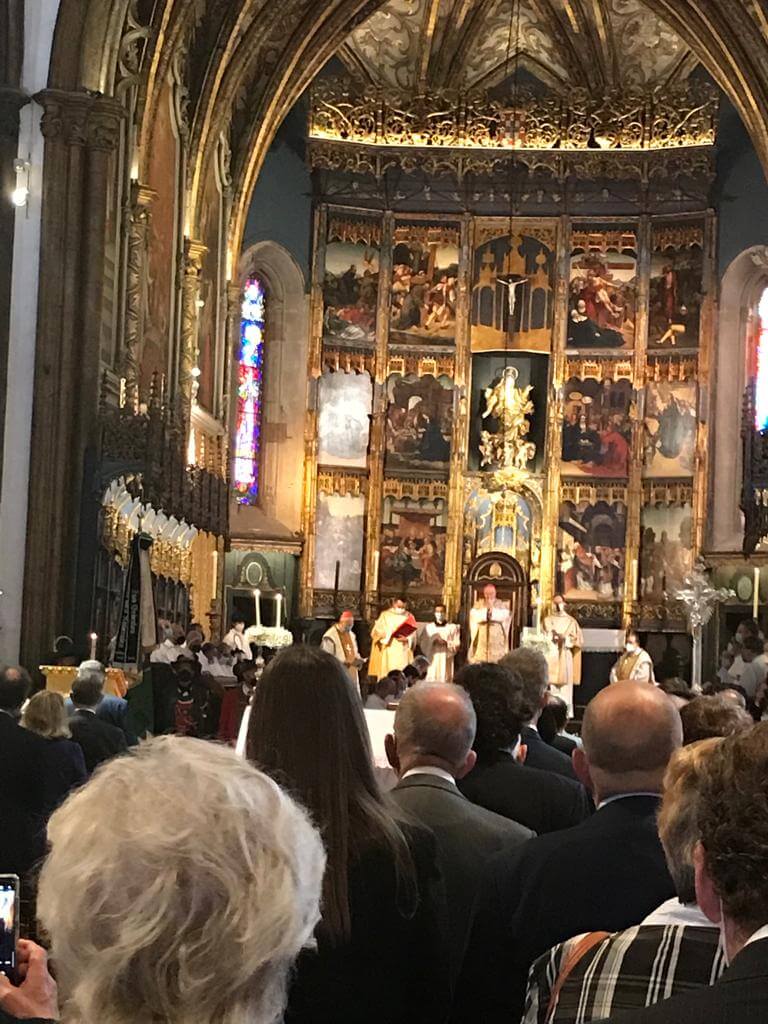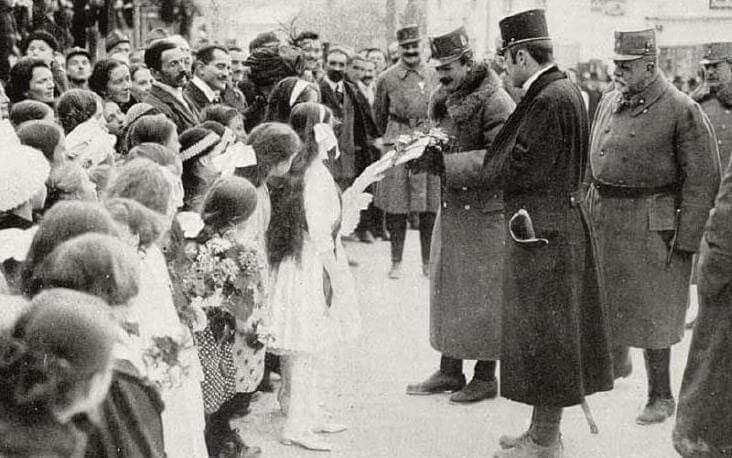Photo: Emperor Karl visiting the residents of Cortina D’Ampezzo, c. 1917. He was known by all during the war (especially his troops) to visit and comfort his people in their suffering.
Editor’s note: as we announced a few weeks ago on the centenary of Blessed Emperor Karl’s birthday into heaven, we have chosen this great modern saint as one of our heavenly patrons at OnePeterFive. Therefore we present this article by one of his modern biographers (and our contributing editor) Mr. Charles A. Coulombe, occasioned by the rites of Holy Week in the Roman rite. This article will be among others reflecting on the life and times of the saint, promoting devotion to him, and the significance of the office of lay ruler and Roman emperor for the restoration of Christendom against our era of liturgical clericalism and clerical abuse. We recommend to all the biography of Blessed Emperor Karl by Mr. Coulombe. To join the Emperor Karl League of Prayer and more information, visit emperorcharles.org.
Those familiar with the ancient rites of Holy Week will have noticed several prayers that were not said. On Good Friday, among the collects, we find one “For the Emperor,” which reads:
Oremus et pro Christianissimo imperatore nostro [Nomen] ut Deus et Dominus noster subditas illi faciat omnes barbaras nationes ad nostram perpetuam pacem….
Omnipotens sempiterne Deus, in cujus manu sunt omnium potestates, et omnium jura regnorum: respice ad Romanum benignus imperium; ut gentes, quae in sua feritate confidunt, potentiae tuae dexterae comprimantur. Per Dominum.
Let us pray also for the most Christian Emperor [Name] that the Lord God may reduce to his obedience all barbarous nations for our perpetual peace….
O almighty and eternal God, in whose hands are all the power and right of kingdoms, graciously look down on the Roman Empire that those nations who confide in their own haughtiness and strength, may be reduced by the power of Thy right hand. Through the same Lord…
Similarly, on Holy Saturday during the Exsultet, after the prayer for the Pope:
Respice etiam ad devotissimum imperatorem nostrum (Nomen) cujus tu, Deus, desiderii vota praenoscens, ineffabili pietatis et misericordiae tuae munere, tranquillum perpetuae pacis accommoda, et coelestem victoriam cum omni populo suo.
Regard also our most devout Emperor [Name] and since Thou knowest, O God, the desires of his heart, grant by the ineffable grace of Thy goodness and mercy, that he may enjoy with all his people the tranquility of perpetual peace and heavenly victory.
Now these had formerly been said throughout Latin Christendom for the Holy Roman Emperor. Bl. Cardinal Schuster wrote regarding Good Friday, “…prayer is made that the Roman Emperor may subdue all the barbarians, and the Roman Empire is considered as the only legitimately constituted temporal power, exactly as St. Leo (the Great) deemed it to be.” When the last of these thus far, Francis II, abdicated his throne in 1806 to become merely Francis I, Emperor of Austria, they stopped being said in most places. Nevertheless, Dom Prosper Gueranger in his coverage of the rites of Good Friday tells us
The Church of Rome, in the following ‘Prayer,’ had in view the Emperor of Germany, who was formerly the head of the Germanic confederation, and, in the Middle Ages, was entrusted by the Church, with the charge of propagating the Faith among the northern nations. This ‘Prayer’ is now omitted, excepting in those countries, which are subject to Austria.
So too for those of Holy Saturday: “The words here put in parentheses are only said in those countries, which are subject to the Emperor of Austria.”
So it was for the Roman Rite, whose Missal contained the prayers until the revision of 1955. As regards the Byzantine Rite, the most commonly used Liturgy, that of St. John Chrysostom, had the prayer in its Anaphora: “Remember our most faithful Emperor (Name) and all his palaces and armies. Grant him, O Lord, a peaceful reign, so that by his tranquility, we may lead quiet and peaceful lives in all godliness and purity.” The Liturgy of St. Basil prayed:
Remember, O Lord, our most devout and faithful Emperor (Name), whom you have set to rule on the earth. Crown him with a weapon of truth, a weapon of good will; let your shadow fall upon his head in the day of war; strengthen his arm, exalt his right-hand, establish his empire; subdue beneath him all barbarous nations that desire to make war; grant him deep and enduring peace; speak good things to his heart for your Church and for all your people; so that by his tranquility we may lead quiet and peaceful lives, in all piety and purity.
After the fall of Constantinople and the assumption of the title of Tsar by the Grand Duke of Moscow, these prayers named him when used by the Russian Orthodox; the Ukrainian, Ruthenian, Romanian, and Serbian Byzantine Catholics offered them for the Austrian Emperor as they successively came under his rule and protection.
A great curiosity is that the last man for whom these prayers were offered were for the same ruler: Bl. Karl – Tsar Nicholas II having been murdered early in 1918 after abdicating the previous year, and Karl being prayed for by his peoples during the Holy Weeks of 1917 and 1918. Thus, in a spiritual and liturgical sense, Bl. Karl was the last Roman Emperor to be prayed for. This is a truth to be kept in mind in this, the centennial year of his death.
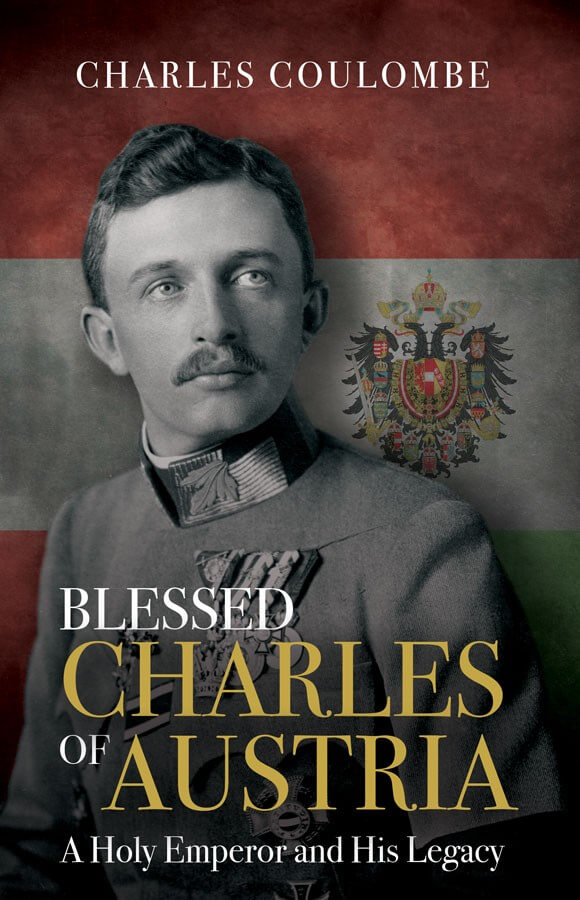 Dedicated as he was to the welfare of the different peoples God had committed to his care, he was determined to lead out of both the external war he had inherited with his throne, and the seemingly endless internal conflicts they had with each other. A devout Catholic, he was aware that his Imperial and Royal vocation required him to have a care for his peoples’ spiritual as well as temporal welfare. His equally pious wife herself descended from French, Spanish, Italian, and Portuguese ruling houses, and so he was deeply connected to the Catholic and Royal traditions of Western Europe as well as his own.
Dedicated as he was to the welfare of the different peoples God had committed to his care, he was determined to lead out of both the external war he had inherited with his throne, and the seemingly endless internal conflicts they had with each other. A devout Catholic, he was aware that his Imperial and Royal vocation required him to have a care for his peoples’ spiritual as well as temporal welfare. His equally pious wife herself descended from French, Spanish, Italian, and Portuguese ruling houses, and so he was deeply connected to the Catholic and Royal traditions of Western Europe as well as his own.
As Our Lord in the Good Friday Reproaches contrasts the various good deeds He did for His people with the atrocious betrayals he received in return, so it was for Bl. Karl. Betrayed on all sides – by allies, enemies, and many of the political leaders of his own peoples, his agonizing death on Madeira could have been prevented had the triumphant Allies not insisted on preventing funds from reaching him and his young family unless he renounced his thrones – in violation of the oaths he and his wife had sworn to God at their Coronation. Bl. Karl knew he was following His Saviour on His Way of the Cross, and forgave all of his persecutors on his deathbed, even as he declared that he was suffering that his peoples might come back together. It was the Centennial of this event that drew me and many others to Madeira last month.
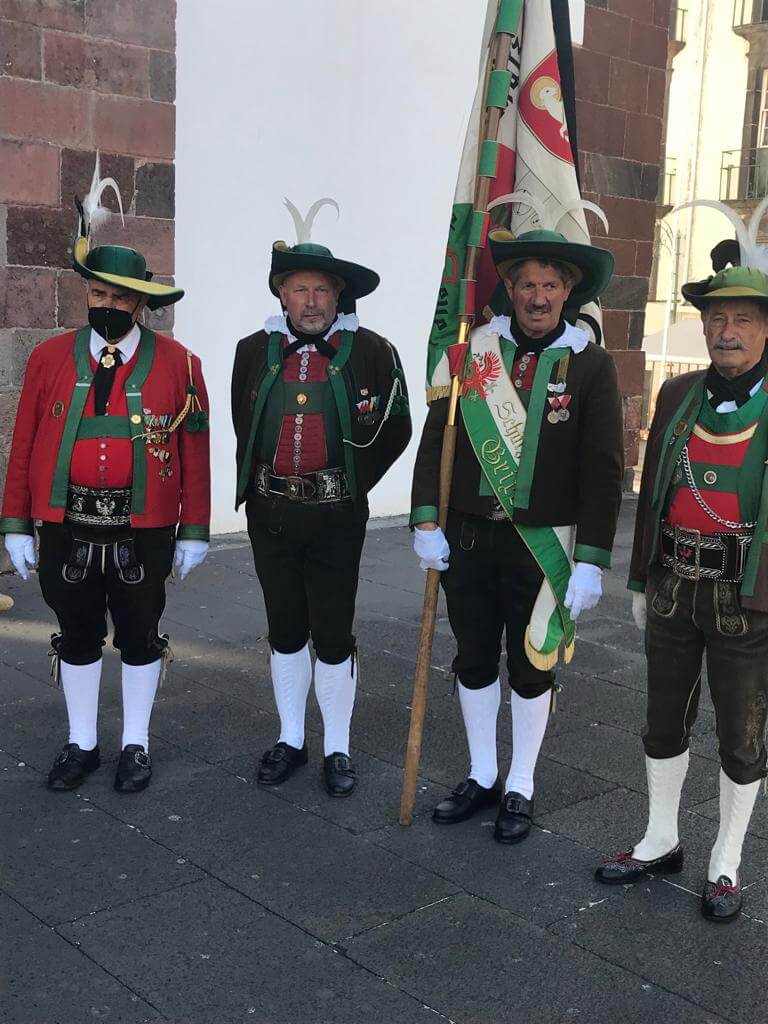
Members from around the World of the Gebetsliga – the Emperor Karl League of Prayer – were prominently represented, as were the Georgsorden (the House of Habsburg’s largest order of chivalry) and various Monarchist and other Habsburg-friendly organisations from Austria, Hungary, Czechia, Croatia, Italy, and elsewhere. The Habsburgs themselves were there in large numbers, spearheaded by the Archduke Karl, senior grandson of the Emperor, his son, Ferdinand, and his younger brother, Georg (now the Hungarian Ambassador to France).
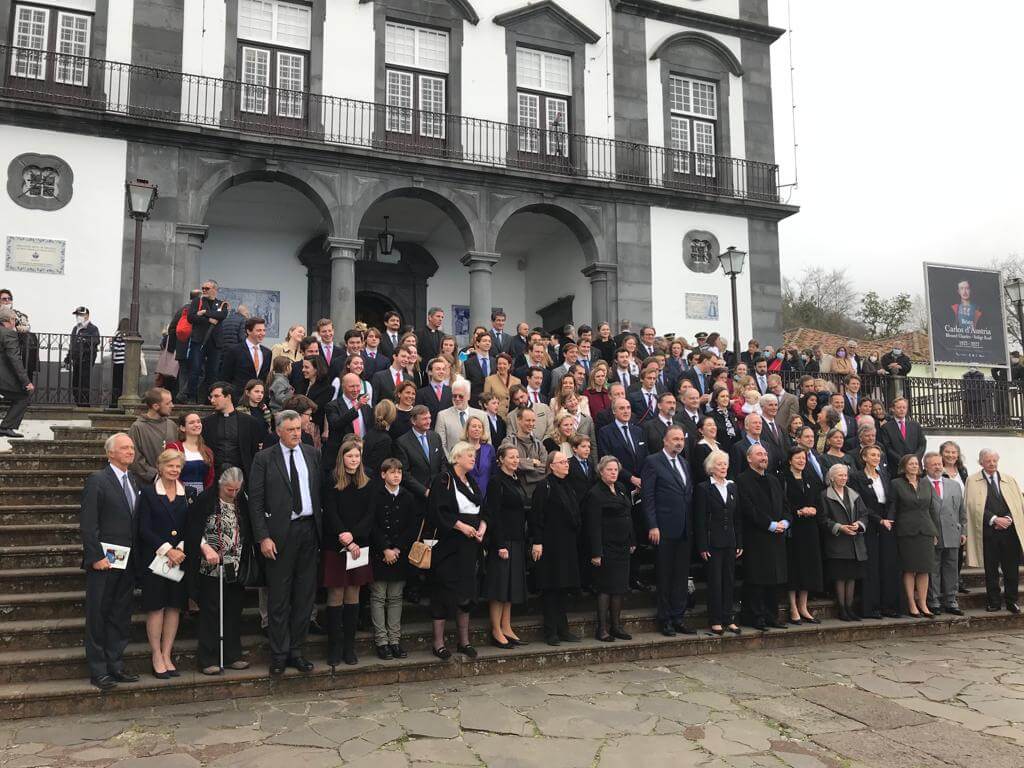
Given both that Madeira is a Portuguese possession, and that Zita was the granddaughter of Dom Miguel, the deposed King of Portugal, it made sense that Dom Duarte, the current heir to the Portuguese throne should be present. Varied as this collection of people were, they were united by a great devotion to Bl. Karl. Coming toward the end of a pandemic and the beginning of a war, the observances were made even more poignant by the reflection that he and his family had passed through similar circumstances prior to his death.
The day before the centennial itself, Thursday March 31, featured a rosary at the Jesuit church, followed by a concert sponsored by the Hungarian Consulate.
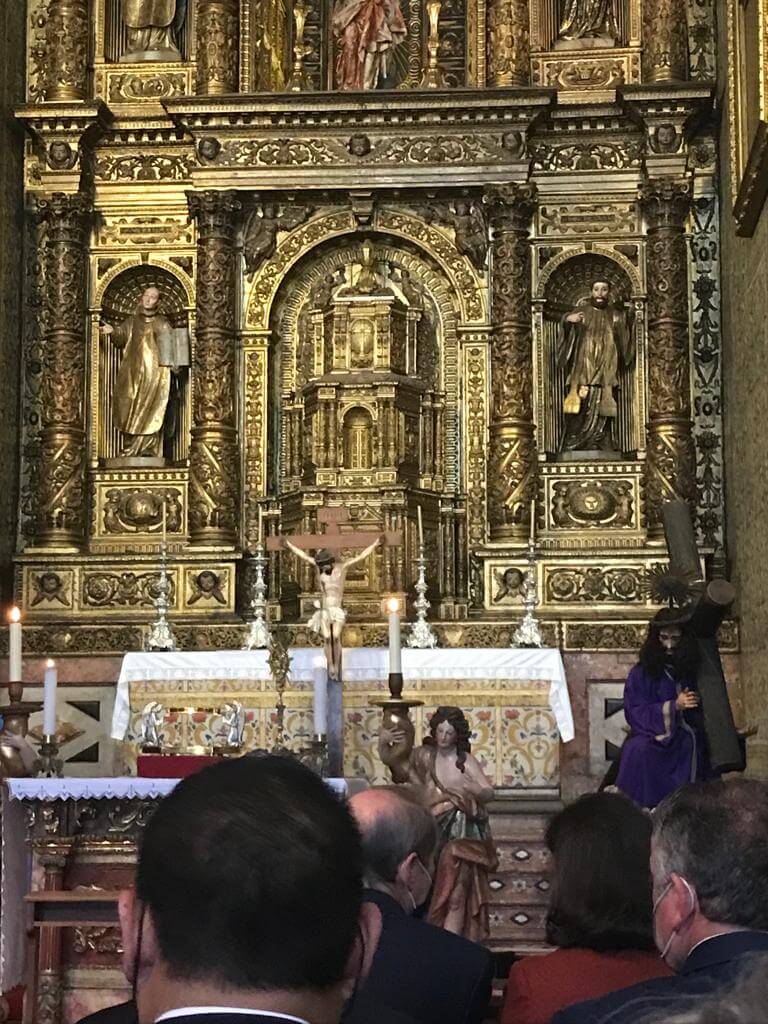
The next day a Solemn Mass was held at the cathedral, followed by a gala lunch for the pilgrims and the family. At last, Holy Hour and Solemn Benediction was offered at the church of Our Lady of the Montes, where the late Emperor is enshrined. As each day went on, the number of flowers at his tomb multiplied.
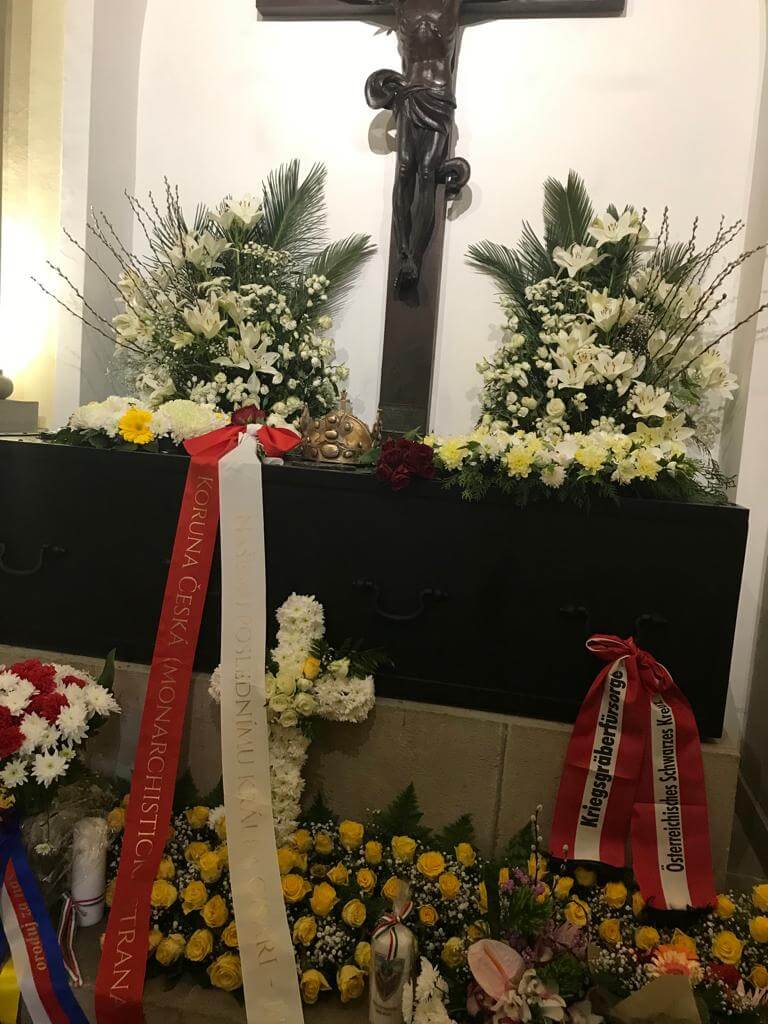
The following day there was an exhibition in his honour. At the Monte, Fr. Benedict Kiely offered Mass in the Ordinariate form. Close to the Anglo-Catholic Masses I had frequented in my teenagerhood, it reminded me of the Emperor’s love of the English and his wish for their conversion. On Sunday, I would go there for Mass one last time. It was a quiet end to a deeply moving series of observances. Echoing this main event were commemorations in Rome (led by Eduard von Habsburg, Hungarian Ambassador to the Holy See), Lisbon, Budapest, Warsaw, Vienna, Prague, Zagreb, Bratislava, and elsewhere.
As a current resident of Austria – and a lover of the sombre but beautiful Kaisergruft, where most of the Habsburg Emperors are entombed, I had always wished that Bl. Karl could be laid to rest with his wife, Zita, and their oldest son, Otto. But this trip to Madeira convinced me that the Blessed Emperor is in precisely the right place. It is not merely that the Austrian Republic has so woefully and continually wronged him and his family, making millions of tourist dollars off their image, while holding on to properties stolen from the family by the Nazis in 1938 – and never missing a chance to denigrate their memory. This, after all, is a game played to a greater or lesser extent by the governments of all the successor states – if not always so thoroughly offensive as with Austria. Were Karl at rest with his ancestors, he would be one among many. In Madeira, he is singular. Moreover, his presence there, rather than in any of his old countries, universalises the “Peace Emperor.”

Mind you, that is not to minimise his significance in his former realms. Trapped between the decadence of Western Europe and North America on the one hand, and the aggression of Russia on the other, Central Europe is struggling to find its own way – retaining European and Christian morals on the one hand, and freedom on the other. This is something that shall require a greater deal of unity among them if it is to succeed, and the prayers and sacrifices of Bl. Charles as well as the efforts of his present descendants may well help to achieve that end.
But, as Karl’s son Otto observed, the boundaries of Europe really extend from San Francisco to Vladivostok – and one might add, pass on to Buenos Aires, Cape Town, and Melbourne. There are now nineteen shrines in Karl’s honour in the United States, and others in Canada, Mexico, Brazil, Chile, Australia, Lebanon, Britain, Belgium, Spain, Switzerland, Italy, France, and Germany – apart from those in areas he formerly ruled. His devotees in an age of widespread perversion, infidelity, and innumerable broken homes are drawn to a man who was a model husband, father, and son; in an age of ever crueler combat increasingly waged against civilians by remote commanders they see in him a chivalrous and personally courageous soldier; and while feckless rulers abuse both their hapless subjects and their own offices the Blessed Emperor towers above them as an exemplar of sacrificial leadership. Like Christ the King he was willing to sacrifice himself for the flock God gave him.
To be sure, across Europe there are many other Monarchical Saints, Blesseds, Venerables, and Servants of God whose devotees revere them for many the same reasons Bl. Karl’s love him – indeed, his consort Zita is one of the latter. Taken together, the witness of these fortunate Royals shows us that rulers do not have to be mere agents of theft and oppression – such as we are used to – but may model themselves after and in time partially resemble the King of Kings. One concrete way of showing this aspiration was the Royal Ceremony of Foot-washing on Maundy Thursday, with which Bl. Karl was familiar. Dom Gueranger observes about it that
We occasionally find Kings and Queens setting this example of humility. The holy King Robert of France, and later, St. Louis, used frequently to wash the feet of the poor. The holy Queens, St. Margarite of Scotland, and St. Elizabeth of Hungary, did the same. …Yea, there are still to be found Kings and Queens who, on this day, wash the feet of the poor, and give them abundant alms.
Indeed, in addition to the Habsburg Emperors, the Kings of France, Spain, Portugal, Two Sicilies, Bavaria, Sardinia, Saxony, and Poland all performed the Rite until either overthrown or replaced with more liberal members of their own dynasties. To-day, the only European Monarchy that retains even a shadow of the custom is Great Britain; the Queen still distributes Maundy money to the poor, although the Foot-washing is long since gone. At any rate, this Rite was done in emulation of Christ at the Last Supper, precisely when He united the Davidic Kingship with the Communio of the Church (creating Christendom). Bl. Emperor Karl certainly partook of Christ’s Kingship as much as any Saintly Monarch who ever lived. Let us pray that others of his kind emerge, and that we ourselves spend eternity with him and his colleagues.
